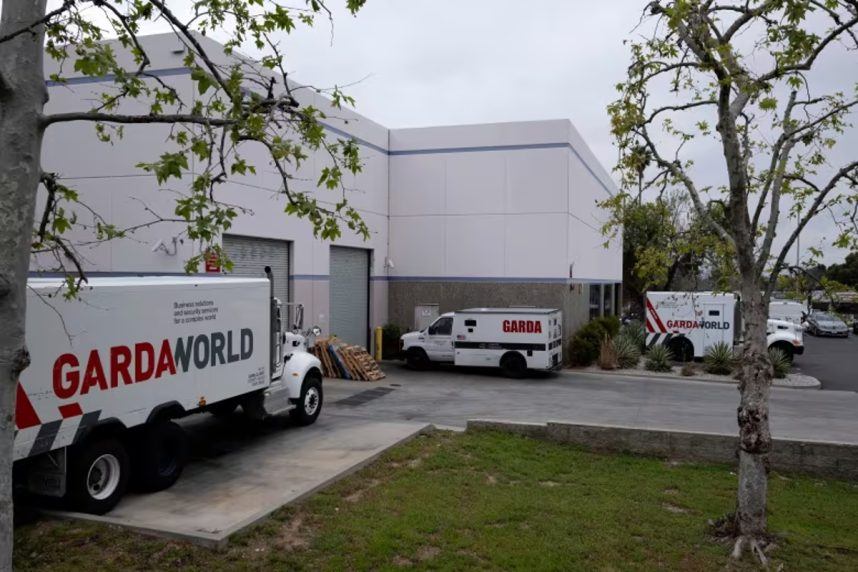$30M Heist Thieves Presumably Have Plan to Launder Money That Doesn’t Involve Casinos

The $30 million heist carried out by professional thieves over the Easter weekend likely had a subsequent plan to wash the dirty money.
The GardaWorld warehouse in the Los Angeles neighborhood of Sylmar where an estimated $30 million was stolen. Security experts think the skilled thieves have a plan in place to wash the money clean. (Image: AP)
In what’s seemingly a blockbuster thriller straight out of Hollywood akin to “Ocean’s 11,” a group of thieves broke into a highly secure money storage facility in Los Angeles on Easter Sunday and managed to get away with an estimated $30 million in cash.
Security experts say the brazen heist almost certainly involved a network of skilled robbers who somehow managed to obtain specific security features and protocols of the warehouse owned by GardaWorld.
GardaWorld is a Canadian-based global cash management and security company that handles large volumes of money and transports it via armored vehicles. The $30 million burglary was only step one of the potential massive payday for the criminals, as washing the money clean could involve a process nearly as complex as the robbery itself.
Casino Laundromats
Casinos for decades have been preferred laundromats for criminals with dirty cash. But with commercial and tribal casinos today equipped with many financial safeguards to detect such illicit movement of money, security experts believe the persons involved in the $30 million heist have a plan in place that avoids Las Vegas.
The act of money laundering, the United States Financial Crimes Enforcement Network (FinCEN) explains, involves disguising financial assets so they can be used without detection of the illegal activity that produced the ill-gotten possessions.
Through money laundering, the criminal transforms the monetary proceeds derived from criminal activity into funds with an apparently legal source,” a FinCEN spokesperson explained to Casino.org. “Money laundering has devastating social consequences” because it can provide funding for drug cartels, terrorists, rogue firearms dealers, and other criminal enterprises.
With $30 million in cash on the street, Las Vegas and other casinos in Nevada and California are on high alert for suspicious activity. Randy Sutton, a former law enforcement detective in New Jersey and Las Vegas who worked on major crimes and robberies, told the Associated Press that the thieves presumably developed a plan to launder the money before executing the sting.
It’s an interesting question: ‘How do you get rid of that amount of cash?’ I know it’s a quandary we’d all like to have, but the reality is these criminals probably had that in their repertoire,” Sutton said.
Sutton presumes a former employee privy to the Sylmar money storage facility’s security network conspired with the robbers.
This took a tremendous amount of research and a tremendous amount of knowledge on the technical end regarding the circumvention of security systems and surveillance,” Sutton explained. “You can bet that not just current [GardaWorld] employees are going to be scrutinized but prior employees as well.”
It’s thought that much of the $30 million in cash had been previously circulated, which will make detecting and locating the money much more difficult than had it been non-issued currency.
Money Laundering Safeguards
Along with the 24/7 “eye in the sky,” the informal phrase referencing casino security cameras constantly monitoring floor activity, casino cages are required by federal law to report suspicious transactions.
The Bank Secrecy Act of 1970, the federal law that brought casinos under the umbrella of “financial institutions,” requires casinos to file a Currency Transaction Report (CTR) with FinCEN anytime a person transacts more than $10K in cash in a single day. The law also requires casinos to complete a Suspicious Activity Report (SAR) when cashiers or any other employee suspects a player’s activity to be unlawful.
Casinos are required to train employees who directly deal with money to detect suspicious activity. Those programs are part of a casino’s anti-money laundering program.
The post $30M Heist Thieves Presumably Have Plan to Launder Money That Doesn’t Involve Casinos appeared first on Casino.org.
Casino.org



